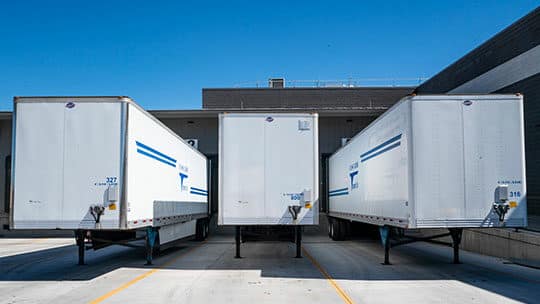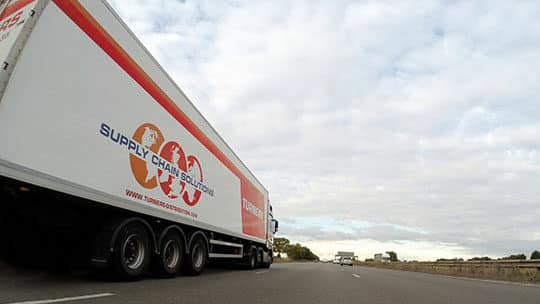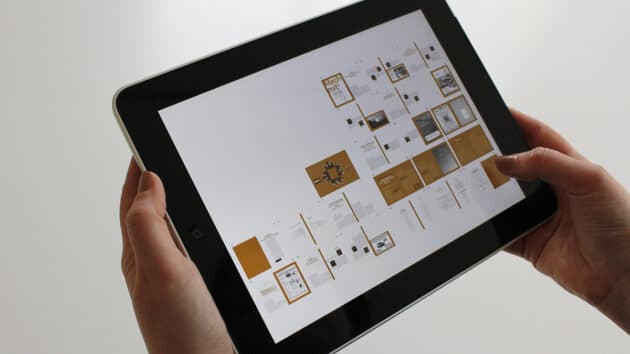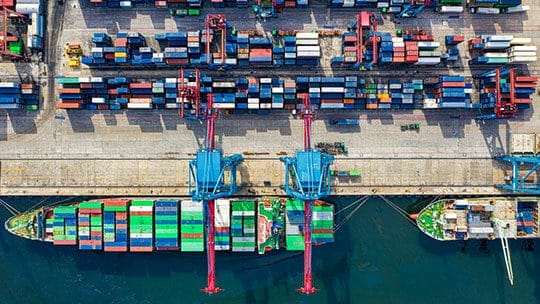“An efficient supply chain is optimized and well-managed.”
There is no option for businesses to keep up with the latest technologies and advancements. When it comes to logistics organizations, the expectations have increased as well. The supply chain consists of various components, which, if monitored and managed appropriately, lead to increased business sales.
Most businesses reduced costs by introducing AI into their supply chains. Digital transformation in logistics has just begun and is bound to change how it operates. Maintaining logistics includes managing traffic to helping drivers and assets prevent fines and violations. It improves productivity while also reducing inventory costs.
This article focuses on five ways digital innovation impacts the future of logistics. However, before that, let us understand how fleet compliance is a great way to streamline the logistics department.
What is fleet compliance and how to achieve it?
Compliance in any business is essential as it leads to the overall efficiency of a business. Fleet compliance enables you to ensure that all vehicles are safe and can do the expected job. Several fleet management software/tools can help your business reduce unscheduled downtime, which could be costly and disruptive to the service.
So if you choose a fleet management tool, as a fleet manager, the areas of compliance would include:
- Vehicle maintenance and repair.
- Warranty.
- Vehicles and acquisition.
- Drivers.
- Licensing.
- Registration and permitting.
- Violations and fines mitigation.
With effective fleet management software, you can store and access all compliance documentation, conduct digital inspections and manage it from anywhere. Remember, safety and compliance should come at the top of your list. Each time a vehicle hits the road, it’s your company that it represents. So ensure you make it a priority for fleet safety and compliance.
There are many fleet management software available in the market. Go through the tools and choose the one that fits your business requirements.
Now that we know the importance of fleet management for businesses, let us look at five ways digital innovation impacts the future of logistics.
Recommended for you: How Amazon Prep Services Can Streamline Your Business?
1. Smooth vehicle management

Whether you commute in your vehicle or use vehicles for business purposes, any vehicle needs to be well-equipped, inspected, and maintained. Doing so not only ensures efficient vehicle management but also regulates costs. You must use data-driven fleet maintenance and management software if your business falls under logistics.
Such tools will store all vehicle-related data in a single system, offering more visibility, easy monitoring, and management of partnerships. Needless to say, digital technology has revolutionized modern logistics operations with software, drones, and robots performing and even predicting several tasks.
Effective vehicle management helps in the following ways:
- It helps you keep a record of every important detail of the vehicle from the vehicle type, and its documentation to the validity date, etc.
- It reduces costs and fuel-consumption
- It helps improve customer engagement and retention
- It improves employee efficiency
- It helps in tracking inventory and all related important assets which eventually helps businesses save time and money
As stated above, efficient vehicle management helps your business in more ways than one. Whether you own a small business or a big one, it is essential to manage your vehicles efficiently. So consider moving to online tools and software to make it easy.
2. Autonomous vehicles

The transportation process has already become semi-autonomous, with autonomous vehicles being a significant part of the logistics. The day is not far when the whole transportation business will get fully autonomous. Examples of autonomous vehicles are forklifts, air terminals, ports, etc. The trucks used in the supply chain to transport goods aren’t autonomous yet.
While self-driving trucks could be the future of logistics, there are some challenges it needs to tackle. Driverless programming that works well even in heavy traffic is one such challenge. Undoubtedly, self-driving trucks are a vital transformation in the logistics industry as they will decrease costs. However, implementing autonomous vehicles in the logistics department will require legal and legislative approval.
Many researchers suggest that autonomous cars will be fully available in the next decade. Other than self-driving trucks, self-driving drones and automated freight ships have also led to the introduction of:
- Lightweight vehicle components.
- Driverless vehicles.
- Electric vehicles.
- Cloud systems.
- GPS gadgets.
Moreover, satellite-based transportation is already in action, which makes air freight forwarding easier. However, this is still a far-fetched solution and your business may not benefit as much from it (especially if you are just starting out). Including GPS in your existing supply chain management is beneficial.
3. Enhanced communication with IoT

The Internet of Things has changed the logistics department. With IoT, we can take communication between vehicles to the next level. You can achieve superior connections with transportation mediums like shipping trucks, ships, cars, planes, etc. Although implementing IoT to enhance communication is still in progress, it is not as far-fetched.
IoT also lets web-powered gadgets enable data gathering. Plus, IoT sensors are used to alert vehicles in case of obstacles on the road during transit. Several intelligent vehicles can also help in the following ways:
- It predicts long and confusing turns.
- It helps prevent accidents.
- It helps in identifying bikes, cycles, and pedestrians.
IoT, along with (Artificial Intelligence) AI, and Machine Learning (ML), can change the transportation business. Vehicle crashes will lessen, and drivers using IoT will be able to monitor brake efficiency, vehicle speed, and fuel usage.
While it is up to your business requirements to decide which tool to go for, it is still wise to go for the latest technology to stay ahead of your competitors. Plus, investing in new advancements will certainly help you garner the desired results.
You may like: How Your Business Can Thrive by Using These 9 Product Launch Strategies?
4. Improved visibility

“Enhanced visibility makes a business efficient.”
Whether you run an e-commerce store or manage a transportation business, data visibility is crucial to the business’s success. Visibility is one of the most critical aspects in the logistics industry since it enables the introduction of anti-theft GPS. You can monitor and reach a truck’s live location through such features, eventually saving businesses from huge potential losses.
Cloud-based systems are another trend in the logistics industry. It is a great way to achieve operational efficiency as it helps businesses track vehicles in real-time and lets you plan space for logistics better. Moreover, it also helps in managing online ticketing. So whether it is improving the visibility of the supply chain or managing it, digital innovation helps achieve both.
Since the tool lets you store data and track each vehicle, it will notify you when a vehicle needs maintenance or is past the validity date. Some tools also allow you to keep the Insurance policy dates so that you are notified when the date is due. These small factors enhance visibility and contribute to smooth vehicle management.
5. More sustainability

“A successful business is a sustainable one.”
Whether logistics or retail, any business needs to devise ways to make it sustainable. Also, being sustainable doesn’t simply mean being environment-friendly. From using products that don’t cause any harm to the environment to disposing of products organically, sustainability comes at the foundation of any business.
Plus, consumers today are more likely to trust businesses that are climate-friendly. It improves the credibility of a business. When it comes to taking sustainable measures in logistics, it will help in the following:
- Reduction of water level contamination.
- Controlling climate changes.
- Reduction of global warming.
- Reduction in air pollution.
Sustainable measures like clean vehicles, driverless fleets, eco-friendly technologies, and e-bikes reduce carbon release. Thus, improving the quality of air and overall improvement of eco-management tracking. The pressure on all types of businesses to be sustainable is increasing.
The latest example of sustainability is electric vehicles. About 51% of US citizens will likely switch to e-vehicles by the next decade. If your business involves a supply chain, keep a node open to changing to e-vehicles. One of the primary reasons is the reduction of fuel, leading to better air quality.
While electric vehicles are a great way to go sustainable as far as supply chain or fleet management is concerned, there are a few other ways to make your business sustainable. For example, you can choose sustainable suppliers and manufacturers instead of non-sustainable ones. However, it is wise to know that going sustainable will cost you more than going by the conventional method.
So before implementing a new tech advancement to your existing system, ensure you incorporate it only if it supports sustainability and fits your budget constraints.
You may also like: 4 Ways Document Automation Can Boost Your Business.
There is no one size fits all solution

There is no one size fits all solution for any business regarding digital innovation and implementing technological advancements. Digitalization is an ever-evolving process, so you need to be aware of the new tools and software and how you can use them for your business. Plus, you need to know the why behind purchasing any tool.
Remember, with the right tool; you can monitor and effectively manage the logistics departments. Plus, with accurate, actionable data, you can make informed decisions to smoothen the process more. So it is crucial to keep an eye on your competitors and the new tech developments that can enhance your business.
Good luck!
This article is written by Parita Pandya. Parita is an Engineer turned Writer. She usually finds herself writing for businesses. When she is not writing, she is either strumming her guitar or penning her thoughts down on paritapandya.com.
 This article is written by Parita Pandya. Parita is an Engineer turned Writer. She usually finds herself writing for businesses. When she is not writing, she is either strumming her guitar or penning her thoughts down on
This article is written by Parita Pandya. Parita is an Engineer turned Writer. She usually finds herself writing for businesses. When she is not writing, she is either strumming her guitar or penning her thoughts down on 




